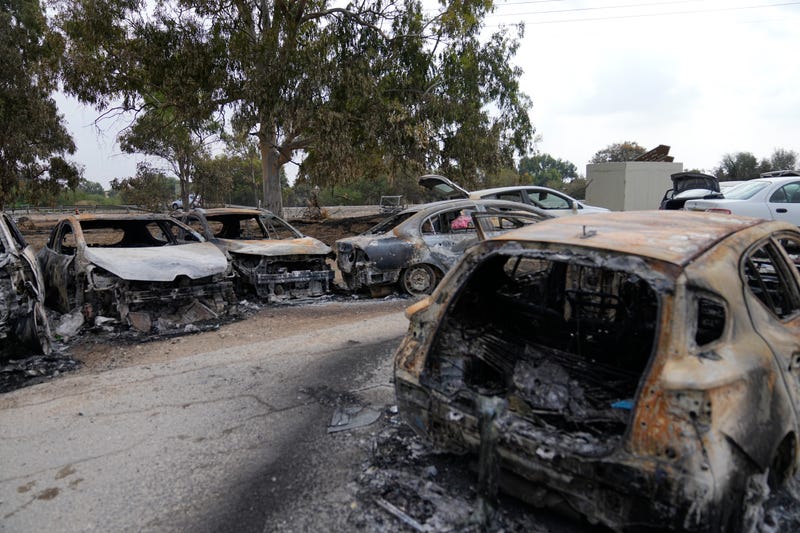
PHILADELPHIA (KYW Newsradio) — Now in its fourth day, the war between Israel and Hamas is expected to escalate as Israeli Prime Minister Netanyahu vows to end what Hamas started. Meanwhile, fears grow about the safety of hostages taken by Hamas as more bodies are discovered in Israel and the death toll on both sides rises to at least 1,800 lives.
Correspondent Jordana Miller in Jerusalem joined KYW Newsradio Tuesday afternoon with new details. She described a southern farming community where the Israeli army found babies among the slaughtered, saying "It's barbaric. Really. It's right out of ... the worst episodes of ISIS."
She said the south is mostly evacuated, and the Israeli army is amassing resources there in preparation for a ground attack.
"And of course, the $64 million question is whether or not Hezbollah — the terrorist group backed by Iran that sits on the Lebanese border — whether or not they will jump in to this war, which would really create a regional war."
'Philly stands with Israel'
At a pro-Israel rally in Center City on Tuesday afternoon, people sang songs of peace in Hebrew and Arabic and carried Israeli flags and banners reading “Philly stands with Israel" as they crossed from LOVE Park to Dilworth Park. Some people there described it as a gathering of people in mourning rather than a rally.
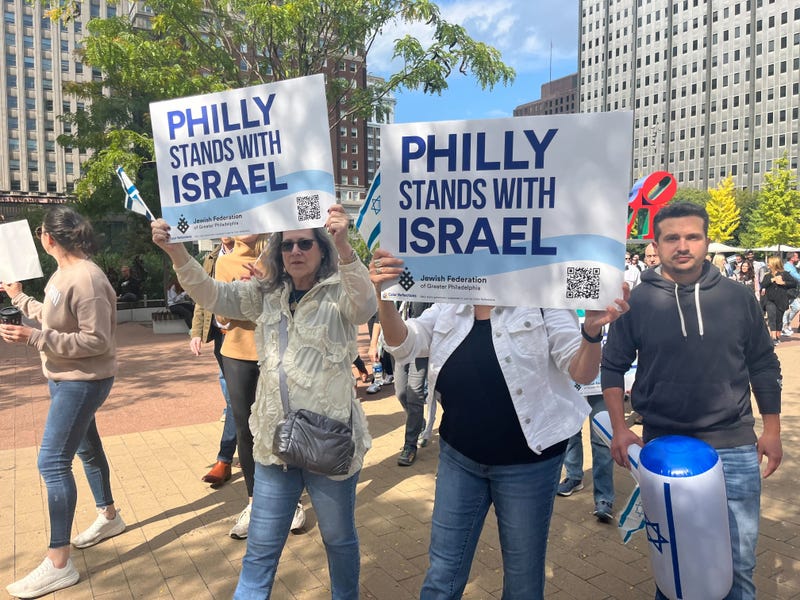
“I'm Jewish. My husband's Israeli. His family's there. We're just so devastated,” said Olga Laster of Havertown. She said they’re still shocked by the brutality of the attacks in Israel.
The attack becomes personal, given Israel's small size and the large Jewish and Israeli population in the Philadelphia area, participants said.
"In Israel, when you have 1,000 people that are being killed, there is no way that you're not going to know someone,” said Dr. Ossie Geifman-Holtzman of Wynnewood.
Kelly Abraham from Northeast Philadelphia said she had just learned that one of her cousins was among the hundreds murdered in the Israeli desert as they fled a music festival under attack.
“Nearby, where the festival was happening, there's some wooded areas, which is where a lot of people ran to hide," Abraham said. "And I'm assuming they got ambushed, because they said they found about 100 people there. And he was one of them.”
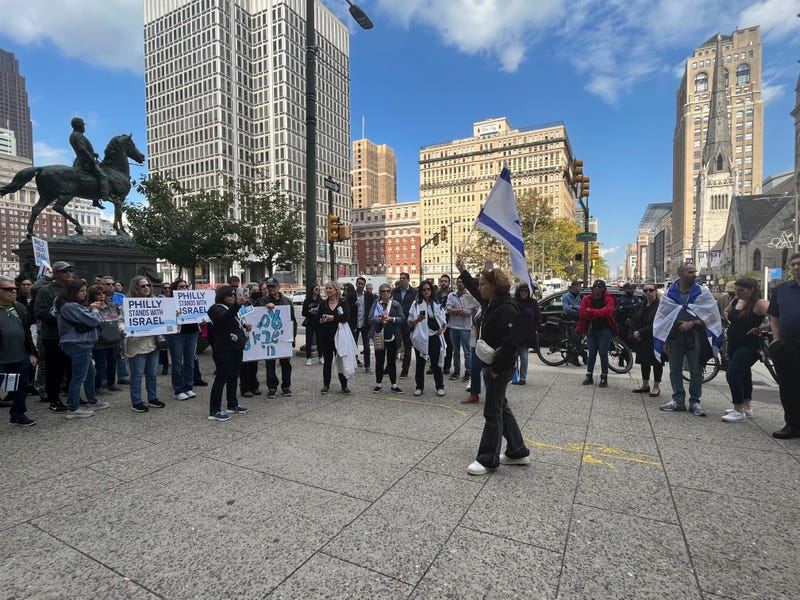
Further Israel solidarity events scheduled to take place include one at Temple Beth Sholom in Cherry Hill on Tuesday night, organized by the Jewish Federation of Southern New Jersey, starting at 7 p.m.; and a prayer vigil at Reform Congregation Keneseth Israel in Elkins Park on Wednesday, at 7 p.m.
Experts explain the war
Jason Holtzman, director of the Jewish Federation of Greater Philadelphia's Jewish Community Relations Council, joined KYW Newsradio live Tuesday morning and expressed the heartache that many in the region are experiencing.
“There are definitely people here in the Philadelphia area who have lost loved ones,” he said. “We know people whose grandmothers have been taken hostage by Hamas and are being held in Gaza.
“I think all of us here in the greater Philadelphia area and the Jewish community and our friends are praying for more peaceful days ahead, but we also know that if this were happening in our own country, that our own country would respond and would work as hard as it could to restore security, which is exactly what the Israeli Defense Forces are doing.”
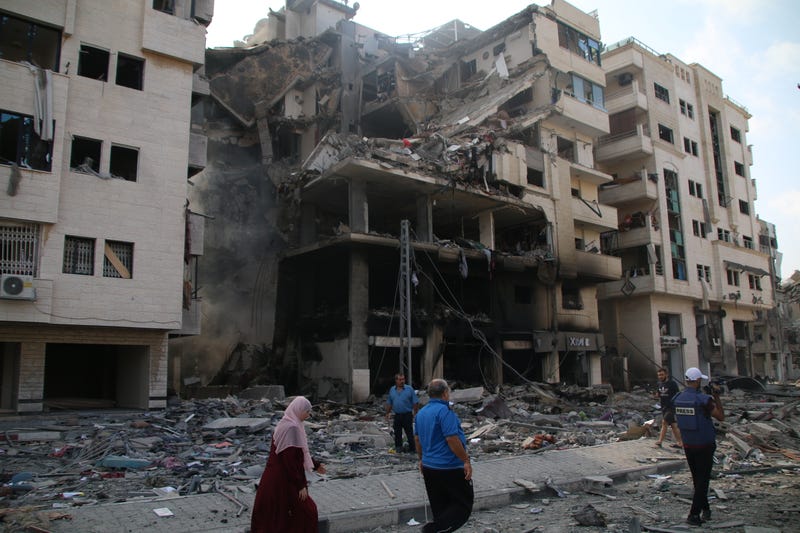
Palestinians who have long been suffering should not be forgotten either, said Sahar Aziz, a Middle East scholar and distinguished professor of law at Rutgers University, who also joined KYW on Tuesday.
“Those who have family and friends in Palestine know all too well that being murdered by the Israeli government is a regular part of their lives,” Aziz said.
“Now to be clear, there’s no justification for a non-state militant group such as Hamas or a nation-state such as Israel to indiscriminately kill civilians. I think at this point, it doesn’t do anyone any good, whether they are Israeli citizens or Palestinians, to resolve this through either permanent occupation, open-air prison or war.”
She believes protecting civilians is vital and would like to see the U.S. and other nations step in to try to broker a ceasefire.
Key takeaways from the conflict
What is happening on the ground?
The Israeli military said Tuesday that it had shelled Syria after rockets hit open land in the occupied Syrian Golan Heights.
The military did not accuse any group of the rocket attack. The Syrian government did not comment. However, Britain-based opposition war monitor the Syrian Observatory for Human Rights says a Palestinian faction conducted the rocket attack from Syrian territory.
Meanwhile, the Israeli military said it struck hundreds of Hamas targets overnight in Gaza. Tens of thousands of residents fled their homes as relentless airstrikes leveled buildings. Along with bombarding downtown Gaza City, Israeli airstrikes also targeted the crossing between Egypt and the city of Rafah in southern Gaza, the only passage out of the territory.
On Tuesday, a large part of Gaza City’s Rimal neighborhood was reduced to rubble after warplanes bombarded it for hours the night before. The Israeli military told residents of the nearby al-Daraj neighborhood to evacuate, and soon after new explosions rocked the area, and Rimal, continuing after nightfall. One strike hit Gaza City’s seaport, setting fishing boats aflame.
Israel expanded its mobilization of military reservists to 360,000 on Tuesday, according the country’s news outlets reported. The chief military spokesman emphasized the unprecedented nature of the current campaign against Hamas, saying “all options are on the table."
The bodies of roughly 1,500 Hamas militants were found on Israeli territory, the military said. It wasn’t immediately clear whether those numbers overlapped with deaths previously reported by Palestinian authorities.
Over 137,000 Palestinians were packed into United Nations shelters, and the World Health Organization reported that the medical supplies it had pre-positioned in seven Gaza hospitals were already used up.
The head of Doctors Without Borders for the Palestinian Territories said he was concerned the humanitarian medical group's team in Gaza would soon run out of medical supplies now that the enclaves borders have closed.
Hamas leaders have not spoken publicly about whether they anticipated Israel’s ferocious retaliation — or the potential risk of losing much of the group’s government infrastructure — when they launched the weekend attack.
What has been the response from the U.S. and other nations?
The Ford carrier strike group has arrived in the far Eastern Mediterranean, within range to provide a host of air support or long-range strike options for Israel if requested, but also to surge U.S. military presence to prevent the now 4-day-old war with Hamas from spilling over into a more dangerous regional conflict, a U.S. official told The Associated Press on Tuesday.
U.S. Secretary of State Antony Blinken is traveling to Israel on an urgent mission to show support for Israel, the State Department said Tuesday as U.S. President Joe Biden continued to condemn Saturday's attack by Hamas, calling it an act of “pure unadulterated evil.”
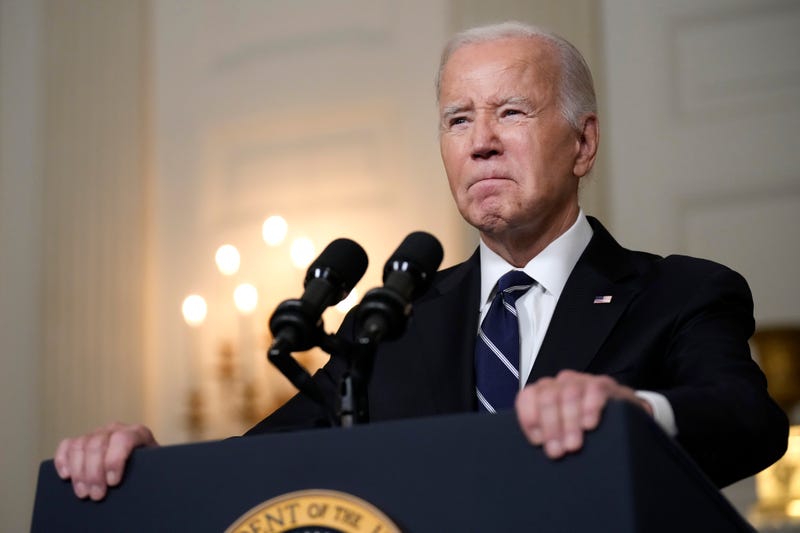
“In this moment, we must be crystal clear: We stand with Israel. We stand with Israel,” he said
Biden warned adversaries not to take advantage of the crisis. “I have one word: Don’t. Don’t.”
Biden and Vice President Kamala Harris spoke by phone earlier on Tuesday with Israeli Prime Minister Benjamin Netanyahu to discuss the situation on the ground. Biden spoke out of the actions he and other allies have taken to support Israel in the aftermath of the attack and expressed his horror about “sickening” reports of torture inflicted by militants on innocent civilians.
The war threatened to delay or derail a country-by-country diplomatic push by the United States to improve relations between Israel and its Arab neighbors. Hamas' attacks in Israel and much of the Arab world’s response to it raised questions about whether Palestinian ambitions for sovereignty could be put aside during the so-called normalization push.
Foreign governments tried to determine how many of their citizens were dead, missing or in need of medical help or flights home from Israel. Japan’s top government spokesperson pledged to do the utmost to protect the safety of a small number of Japanese citizens in the conflict area.
White House National Security Adviser Jake Sullivan said Tuesday that at least 20 U.S. citizens are unaccounted for.
Eighteen Thais were feared dead based on reports from employers, Thai Foreign Ministry spokesperson Kanchana Patarachoke said Tuesday. A first batch of 15 evacuees was scheduled to board a flight to arrive in Thailand on Thursday.
Ambassador to Israel Pannabha Chandraramya said the Thai Embassy was in touch with Israeli authorities about Thai nationals who were abducted by militant groups but has not been informed of their conditions or whereabouts.
The Austrian government said three Austrian-Israeli dual citizens may be among the people kidnapped by Hamas during its attack on Israel. Italy's foreign minister said an Italian-Israeli couple living on the Be'eri Kibbutz had been missing since the incursion and were “probably taken hostage.”
Arab foreign ministers planned to convene Wednesday in Cairo at the behest of the Palestinians. Arab League Assistant Secretary-General Hossam Zaki said the ministers would discuss Arab efforts to “stop the Israeli aggression” on Gaza.
What have been some ripple effects of the war?
Major airlines have suspended flights in and out of Israel. Scores of arriving and departing flights at Tel Aviv’s Ben Gurion International Airport were canceled or delayed, according to the airport’s online flight board, which also showed a steady trickle of flights. Most were operated by Israel’s national airline El Al along with others by regional carriers such as Turkey’s Pegasus Airlines and Greece’s Blue Bird Airways.
Finnish carrier Finnair on Tuesday followed American Airlines, United Airlines, Delta Air Lines and German airline Lufthansa in suspending service to and from Israel.
Hong Kong leader John Lee said the government had issued a red outbound travel alert for Israel, becoming the latest government telling its citizens to avoid non-essential travel to the country.
Spanish multinational clothing company Inditex, owner of Zara, Massimo Dutti and other fashion brands, said it was temporarily closing its 84 franchised stores in Israel for security reasons.
What prompted the attack?
Hamas officials cited long-simmering tensions, including a dispute over the sensitive Al-Aqsa Mosque sacred to both Muslims and Jews. Competing claims over the site, known to Jews as the Temple Mount, have spilled into violence before, including a bloody 11-day war between Israel and Hamas in 2021.
In recent years, Israeli religious nationalists — such as Itamar Ben-Gvir, the national security minister — have increased their visits to the compound. Last week, during the Jewish harvest festival of Sukkot, hundreds of ultra-Orthodox Jews and Israeli activists visited the site, prompting condemnation from Hamas and accusations that Jews were praying there in violation of the status quo agreement.
Hamas also has cited the expansion of Jewish settlements on lands Palestinians claim for a future state and Ben-Gvir’s efforts to toughen restrictions on Palestinian prisoners in Israel.
Tensions escalated with recent violent Palestinian protests. In negotiations with Qatar, Egypt and the United Nations, Hamas has pushed for Israeli concessions that could loosen the 17-year blockade on the enclave and help halt a worsening financial crisis.
The Associated Press contributed to this report.
